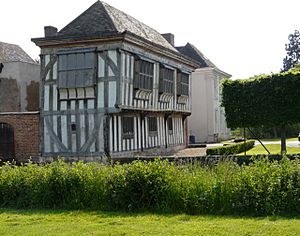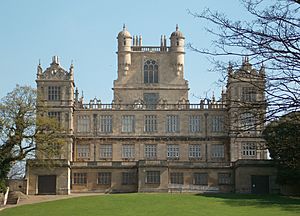Thomas Willoughby, 1st Baron Middleton facts for kids
Thomas Willoughby, 1st Baron Middleton (born April 9, 1672 – died April 2, 1729), was an important politician in England. He was a member of the English and British Parliaments from 1698 to 1711. Later, he was given the special title of Baron Middleton, which meant he became a member of the House of Lords.
Early Life and Family
Thomas Willoughby was born at Middleton Hall in Warwickshire. He was the second son of Francis Willughby, who was a famous mathematician and naturalist. Sadly, Thomas's father passed away not long after he was born.
In 1676, Thomas's mother, Emma, married Sir Josiah Child, who was also a Member of Parliament. The family then moved to Wanstead in Essex. Thomas's older brother, Francis, wanted him to go to university. So, Thomas started studying at St Catharine's College, Cambridge, and later moved to Jesus College, Cambridge.
In 1688, his brother Francis died young, and Thomas inherited the family estates. These included Middleton in Warwickshire and the grand Wollaton Hall in Nottinghamshire.
After university, Thomas lived at Wollaton Hall and continued his studies. He became involved in local public life. In 1689, he was made a Justice of the Peace for Nottinghamshire, helping to keep law and order. He also became the Chief Forester of Langton Arbor in Sherwood Forest. In 1691, he married Elizabeth Rothwell. A few years later, in 1693, he was chosen to be a Fellow of the Royal Society, which is a very old and respected group for scientists.
His Time in Politics
Thomas Willoughby became a very influential person in his area. In 1695, he was appointed High Sheriff of Nottinghamshire, a role that involved managing legal matters in the county.
In 1698, he was elected as a Member of Parliament for Nottinghamshire. This meant he represented the people of Nottinghamshire in the House of Commons, helping to make laws for the country. He was also made High Sheriff of Lincolnshire in 1699, extending his influence.
He was re-elected to Parliament several times. In 1706, he was granted the title of High Steward of the Honour of Peveril, which was a special area in Nottinghamshire and Derbyshire known for its valuable coal mines.
In 1710, Thomas Willoughby became the Member of Parliament for Newark. He was known as a "worthy patriot" for trying to fix problems in the government.
Becoming a Baron
In 1711, a very important position became available: Warden of Sherwood Forest. Thomas Willoughby wanted this job, but Robert Harley, a powerful politician, took it for himself. However, Harley had another plan for Thomas.
To gain more support for his political party in the House of Lords (the other part of Parliament), Robert Harley decided to make Thomas Willoughby a Baron. So, on January 1, 1712, Thomas became Baron Middleton. This meant he left his seat in the House of Commons and moved to the House of Lords, where he continued to be an important voice in politics.
Baron Middleton remained a key figure in his political party in Nottinghamshire. He even helped his eldest son get elected to Parliament in 1713. In 1714, he was given another important local role as High Steward of Sutton Coldfield. He also supported the creation of the Cyclopaedia, a large dictionary of arts and sciences, in 1728.
Death and Legacy
Lord Middleton passed away on April 7, 1729, and was buried at Middleton. He left behind two sons:
- Francis Willoughby, 2nd Baron Middleton (1692–1758)
- The Hon Thomas Willoughby (1694–1742), who also had children.
His wife, Elizabeth, died in 1736.
 | Bayard Rustin |
 | Jeannette Carter |
 | Jeremiah A. Brown |



